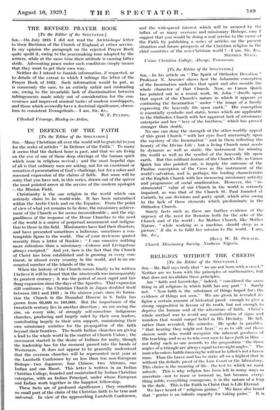IN DEFENCE OF THE FAITH
[To the Editor of the SPECTATOR.]
SIR, —Many Christians all over the world will be grateful to you for the series of articles "In Defence of the Faith." To many it seems that the darkest hour is past, and that we are living on the eve of one of those deep stirrings of the human spirit which issue in religious revival ; and the most hopeful sign of all is that ordinary men are asking, not for an emotional or sensation31 presentation of God's challenge, but for a sober and reasoned expression of the claims of faith. But some will be sorry that you have not, in this series, drawn out of the quiver the most pointed arrow at the service of the modern apologist —the Mission Field.
Christianity is the one religion in the world which can seriously claim to be world-wide. It has been naturalized within the Arctic Circle and on the Equator. From the point of view of what yet remains to be done, the missionary achieve- ment of the Church so far seems inconsiderable ; and the nig- gardliness of the response of the Home Churches to the need of the world is a source of perpetual amazement and indigna- tion to those in the field. Missionaries have had their disasters, and have presented sometimes a ludicrous, sometimes a con- temptible figure to the world. One of your reviewers quoted recently from a letter of Ruskin : "I can conceive nothing more ridiculous than a missionary—Colenso and Livingstone always excepted." And yet, here is the fact that the Church of Christ has been established and is growing in every con- tinent, in almost every country in the world, and in an un- counted number of the islands of the sea.
When the history of the Church comes finally to be written I believe it will be found that the nineteenth was incomparably its greatest century ; it was the period of most rapid and far- flung expansion since the days of the Apostles. That expansion still continues ; the Christian Church in Japan doubled itself between 1911 and 1921; in the sixteen years since its forma- tion the Church in the Domabal Diocese in S. India has grown from 60,000 to 160,000. But the importance of the twentieth century lies in another direction ; we are seeing the rise, on every side, of strongly self-conscious indigenous churches, producing and largely ruled by their own leaders, contributing largely to their own support, maintaining their own missionary societies for the propagation of the faith beyond their frontiers. The South Indian churches are giving a lead to the whole world in the matter of Church Union ; the movement started in the desire of Indians for unity, though the leadership has for the moment passed into the hands of Westerners. It does not appear to be generally understood that the overseas churches will be represented next year at the Lambeth Conference by no less than ten non-European Bishops—two Japanese, four Chinese, two Africans, one Indian and one Maori. This letter is written in an Indian Christian College, founded and maintained by Indian Christian enterprise, with an Indian Principal, under whom European and Indian work together in the happiest fellowship.
These facts are of profound significance ; they constitute no small part of the claim of the Christian faith to be true and universal. In view of the approaching Lambeth Conference, and the widespread interest which will be aroused by the influx of so many overseas and missionary Bishops, may I suggest that you would be doing a real service to the cause of the Faith by publishing a series of articles on the present situation and future prospects of the Christian religion in the chief countries of the non-Christian world ?—I am, Sir, &c., STEPHEN NEI LL. Union Christian College, Ahcaye, Travancore.
































 Previous page
Previous page